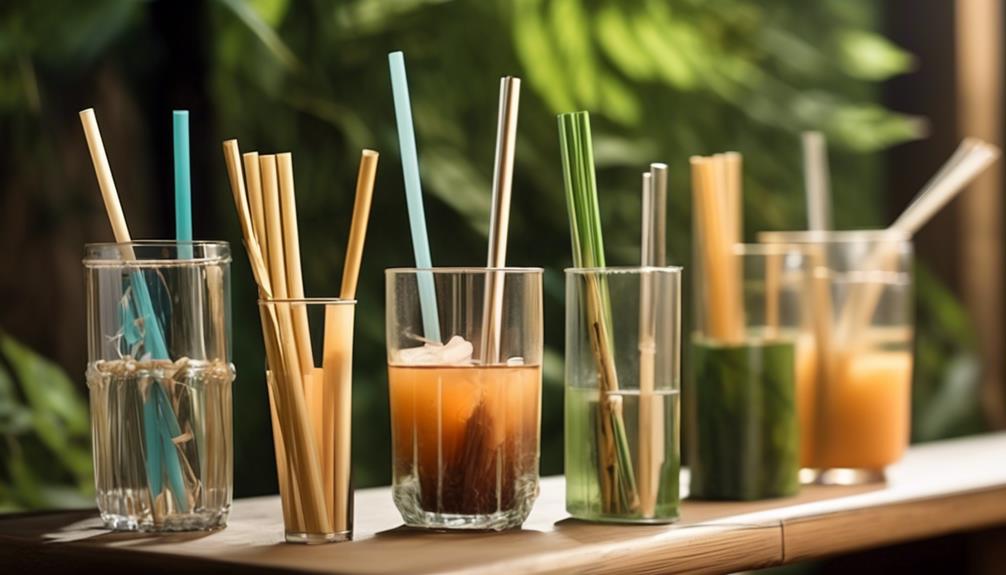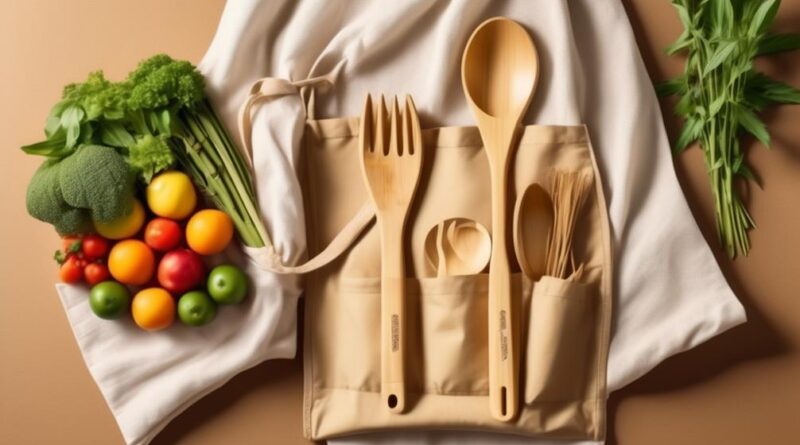What Are the Top Biodegradable Alternatives to Plastic?
Looking to lessen your plastic footprint? The plethora of biodegradable alternatives to plastic may surprise you.
From plant-based plastics to compostable bags, there are a multitude of options available that are both eco-friendly and sustainable.
But which of these alternatives truly stand out in terms of effectiveness and practicality?
Let's explore the top biodegradable options that could revolutionize the way you approach everyday items, from cutlery to packaging and beyond.
Plant-Based Plastics
If you're considering alternatives to traditional plastic, plant-based plastics offer a biodegradable option that can help reduce environmental impact. These plastics are derived from renewable resources such as corn, sugarcane, and potato starch, making them a more sustainable choice compared to conventional plastics made from non-renewable petroleum. By utilizing plant-based materials, the production of these plastics generates fewer greenhouse gas emissions and reduces the reliance on finite fossil fuels, thereby lessening their environmental impact.
Consumer acceptance of plant-based plastics has been steadily increasing as more people become aware of the detrimental effects of traditional plastics on the environment. With growing concerns about plastic pollution and its long-term consequences, consumers are seeking eco-friendly alternatives. Plant-based plastics not only address these concerns but also offer the convenience and functionality that consumers expect from plastic products.
As a result, many companies are now incorporating plant-based plastics into their packaging and products, responding to the rising demand for environmentally friendly options.
Compostable Bags
As you consider eco-friendly alternatives to traditional plastic, compostable bags offer a biodegradable option that aligns with the sustainability of plant-based plastics.
Compostable bags are made from biodegradable film, typically derived from cornstarch, which breaks down naturally, making them an environmentally friendly choice. When it comes to composting benefits, these bags can be easily added to your compost pile, where they'll decompose along with other organic materials, leaving behind no harmful residue. This not only reduces the amount of waste sent to landfills but also enriches the soil with organic matter, supporting healthy plant growth.
The biodegradable film used in compostable bags is designed to break down into non-toxic components, leaving behind humus, which is a nutrient-rich material that enhances soil fertility. This means that as the bag decomposes, it contributes to the creation of a fertile environment for plant growth, aligning with the principles of circular economy and sustainable living.
In addition to their composting benefits, compostable bags also offer the convenience and functionality of traditional plastic bags, making them a practical choice for everyday use. Whether you're shopping for groceries or looking for a way to store organic waste for composting, compostable bags provide a sustainable solution that minimizes environmental impact.
Biodegradable Cutlery
Looking for a sustainable alternative to traditional plastic cutlery? Biodegradable cutlery offers a solution that's both eco-friendly and practical. Here are three sustainable materials that are making a positive impact on the environment.
- PLA (Polylactic Acid): PLA is derived from renewable resources such as cornstarch or sugarcane. It's fully biodegradable and compostable, making it an excellent choice for cutlery. PLA cutlery has a minimal environmental impact, as it breaks down into non-toxic components, leaving behind nutrient-rich compost.
- Wheat Straw: Cutlery made from wheat straw is a byproduct of wheat grain production. This sustainable material offers a natural alternative to traditional plastic. Wheat straw cutlery is biodegradable and compostable, reducing the reliance on non-renewable resources and minimizing environmental impact.
- Bamboo: Bamboo is a highly sustainable material that grows rapidly and requires minimal water and no pesticides. Bamboo cutlery isn't only biodegradable but also durable and reusable. Its environmental impact is minimal, as bamboo is capable of regenerating without the need for replanting.
Eco-Friendly Packaging
Eco-friendly packaging plays a crucial role in reducing the environmental impact of disposable products, just like biodegradable cutlery. When it comes to eco-friendly packaging, the use of sustainable materials is key. Sustainable materials are those that are sourced from renewable resources and are manufactured in a way that has minimal impact on the environment. These materials include bioplastics, recycled paper, cardboard, and compostable materials.
The environmental impact of traditional packaging, such as plastic and Styrofoam, is significant. These materials take hundreds of years to decompose and often end up in landfills or polluting the oceans. In contrast, eco-friendly packaging made from sustainable materials can biodegrade or be recycled, reducing the amount of waste that ends up in landfills and minimizing pollution.
Natural Fiber Clothing
Natural fiber clothing offers a sustainable and eco-friendly alternative to synthetic materials, providing comfort and style while reducing environmental impact. When you choose natural fiber clothing, you aren't only making a fashion statement but also contributing to a healthier planet.
Here are three key reasons why natural fiber clothing is beneficial:
- Sustainable Materials: Natural fiber clothing is made from materials such as cotton, linen, hemp, and bamboo, which are renewable and biodegradable. These materials have minimal environmental impact compared to synthetic fibers like polyester or nylon. By opting for clothing made from sustainable materials, you're supporting ethical and environmentally responsible fashion practices.
- Comfort and Breathability: Natural fibers offer superior comfort and breathability, making them ideal for everyday wear. Fabrics like organic cotton and linen are soft on the skin and allow air to circulate, keeping you cool and comfortable. This not only enhances your wearing experience but also reduces the need for excessive washing and drying, thereby saving energy and water.
- Reduced Environmental Impact: Choosing natural fiber clothing helps reduce the release of microplastics into the environment. Synthetic fibers shed microplastics during washing, which ultimately end up in oceans and waterways, posing a threat to marine life. By opting for natural fibers, you can minimize this environmental impact and contribute to a cleaner planet.
Bamboo Toothbrushes
Bamboo toothbrushes offer a sustainable and biodegradable alternative to traditional plastic toothbrushes, reducing environmental impact while promoting eco-friendly oral care habits. These toothbrushes are made from sustainable materials, specifically bamboo, a fast-growing plant that requires minimal water and no pesticides to thrive. By opting for bamboo toothbrushes, you contribute to the reduction of plastic waste that litters landfills and oceans, as they naturally biodegrade at the end of their lifespan.
The environmental impact of traditional plastic toothbrushes is significant, with billions ending up in landfills each year. These plastic toothbrushes take hundreds of years to decompose, contributing to pollution and harming marine life. In contrast, bamboo toothbrushes are a more eco-friendly choice because they decompose much faster, minimizing their impact on the environment.
When using bamboo toothbrushes, you actively participate in reducing your environmental footprint. The sustainable materials used in these toothbrushes help preserve natural resources and support a healthier planet for future generations. By making the simple switch to bamboo toothbrushes, you contribute to a significant reduction in plastic pollution, aligning your oral care routine with environmentally conscious practices.
Embracing bamboo toothbrushes is a small but impactful step towards a more sustainable future.
Alternative Straws

Looking for a sustainable option for sipping your favorite beverages? Say goodbye to plastic straws and explore these eco-friendly alternatives that aren't only biodegradable but also stylish and reusable.
- Paper Straws: These straws are made from biodegradable materials, such as paper, and are a great option for single-use purposes. They're sturdy and come in various designs, making them perfect for parties, events, or everyday use.
- Silicone Straws: Reusable silicone straws are a durable and flexible alternative to plastic. They're easy to clean, dishwasher safe, and can be used over and over again. Silicone straws also come in a range of colors, adding a fun and vibrant touch to your beverages.
- Metal Straws and Glass Straws: Both metal and glass straws are excellent long-term alternatives to plastic. Metal straws are usually made from stainless steel, making them resistant to corrosion and suitable for hot or cold drinks. On the other hand, glass straws are elegant, easy to clean, and provide a unique drinking experience.
Wood Pulp Tableware
Introducing a sustainable and biodegradable option for serving your meals and snacks, wood pulp tableware provides an eco-friendly alternative to traditional plastic or paper products. Made from sustainable sourcing, wood pulp tableware is derived from renewable materials such as bamboo, sugarcane, and wood fibers. This ensures that the production process has minimal environmental impact, making it an ideal choice for conscientious consumers.
The sustainable sourcing of wood pulp tableware involves using materials that can be replenished naturally. This reduces the reliance on finite resources and helps in preserving the environment. Additionally, the use of renewable materials contributes to lower carbon emissions and lessens the overall environmental footprint compared to conventional plastic or paper tableware.
When it comes to environmental impact, wood pulp tableware stands out as a biodegradable and compostable option. After use, it can be easily disposed of in compost bins, where it breaks down naturally without releasing harmful chemicals into the environment. This significantly reduces the amount of waste ending up in landfills and helps in the effort to combat plastic pollution.
Frequently Asked Questions
Are There Any Regulations or Certifications to Look for When Purchasing Biodegradable Alternatives to Plastic?
When purchasing biodegradable alternatives to plastic, it's essential to look for certifications and regulations.
Some key certifications to consider are the Biodegradable Products Institute (BPI) and the Compostable Logo. These certifications ensure that the products meet specific standards for biodegradability and compostability.
Additionally, it's important to check if the materials are accepted at local composting facilities to ensure proper disposal.
Always look for clear indications of compliance with regulations and certifications.
How Long Does It Take for Biodegradable Cutlery to Decompose in a Landfill or Composting Facility?
In a landfill, biodegradable cutlery can take around 2-5 years to decompose. In a composting facility, it can break down within 180 days. Understanding these decomposition rates is crucial for environmental benefits and consumer awareness.
When considering biodegradable alternatives to plastic, it's important to recognize the varying landfill decomposition and composting rates. This information allows us to make informed choices about sustainable products.
Can Eco-Friendly Packaging Still Provide the Same Level of Protection for Products as Traditional Plastic Packaging?
When it comes to eco-friendly packaging, you might wonder if it can still provide the same level of protection for products as traditional plastic packaging.
Sustainable materials, environmental certifications, and compostable cutlery are great options. Additionally, natural fiber clothing and durable bamboo toothbrushes are gaining popularity. They offer both protection and sustainability.
While plastic toothbrushes are effective, these alternatives are worth considering for a more environmentally friendly choice.
What Are the Environmental Impacts of Producing Natural Fiber Clothing Compared to Traditional Synthetic Materials?
When considering the environmental impact of natural fiber clothing versus traditional synthetic materials, it's important to note that production regulations play a key role.
While natural fiber clothing has biodegradable properties and shorter decomposition times, it's also essential to ensure that production processes adhere to eco-friendly standards.
Additionally, bamboo toothbrushes and biodegradable cutlery offer durability and effectiveness, while eco-friendly packaging can still provide adequate protection for products.
Are There Any Downsides to Using Bamboo Toothbrushes Compared to Traditional Plastic Ones in Terms of Durability and Effectiveness?
When it comes to bamboo toothbrushes, they offer great sustainability benefits and are effective for daily use.
However, in terms of durability, they may not last as long as traditional plastic ones.
While they're environmentally friendly and effective for oral hygiene, the durability factor might mean you'll need to replace them more often.
Conclusion
So, there you have it – a variety of biodegradable alternatives to plastic that aren't only better for the environment but also for your health.
Making the switch to plant-based plastics, compostable bags, biodegradable cutlery, and eco-friendly packaging can greatly reduce the amount of plastic waste in our landfills and oceans.
By choosing natural fiber clothing, bamboo toothbrushes, alternative straws, and wood pulp tableware, you can make a positive impact on the planet.
Make the change today!
